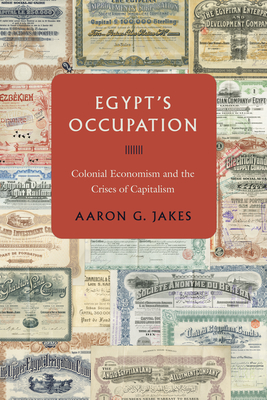

 Stanford University Press
Stanford University Press
Egypt's Occupation: Colonial Economism and the Crises of Capitalism


Key Metrics
- Aaron G Jakes
- Stanford University Press
- Paperback
- 9781503612617
- 8.9 X 6 X 1 inches
- 1.15 pounds
- History > Middle East - Egypt (see also Ancient - Egypt)
- English
 Secure Transaction
Secure TransactionBook Description
The history of capitalism in Egypt has long been synonymous with cotton cultivation and dependent development. From this perspective, the British occupation of 1882 merely sealed the country's fate as a vast plantation for European textile mills. All but obscured in such accounts, however, is Egypt's emergence as a colonial laboratory for financial investment and experimentation. Egypt's Occupation tells for the first time the story of that financial expansion and the devastating crises that followed.
Aaron Jakes offers a sweeping reinterpretation of both the historical geography of capitalism in Egypt and the role of political-economic thought in the struggles that raged over the occupation. He traces the complex ramifications and the contested legacy of colonial economism, the animating theory of British imperial rule that held Egyptians to be capable of only a recognition of their own bare economic interests. Even as British officials claimed that economic development and the multiplication of new financial institutions would be crucial to the political legitimacy of the occupation, Egypt's early nationalists elaborated their own critical accounts of boom and bust. As Jakes shows, these Egyptian thinkers offered a set of sophisticated and troubling meditations on the deeper contradictions of capitalism and the very meaning of freedom in a capitalist world.
Author Bio
I am an Assistant Professor of History at The New School for Social Research and Eugene Lang College, where I teach courses on the modern Middle East and South Asia, global environmental history, and the historical geography of capitalism.
My first book project, published with Stanford University Press in summer 2020, is entitled Egypt's Occupation: Colonial Economism and the Crises of Capitalism. It explores both the political economy of the Egyptian state and the role of political-economic thought in the struggle over British rule following the occupation of 1882.
For decades now, Egypt has appeared as a classic case of peripheral development. From this perspective, British rule simply reinforced Egypt’s prior status as a producer of raw cotton and a market for manufactured goods from Europe. All but obscured in this version of things is Egypt’s emergence as a key site for investment and experimentation in the worldwide financial expansion that characterized global capitalism at the close of the nineteenth century. Egypt's Occupation tells for the first time the story of that financial boom and the protracted crisis that followed.
And it argues that this long-neglected process of financialization was of central importance to the politics of British rule. Across the three decades of Britain’s “veiled protectorate,” Egypt's Occupation traces the complex career of the discourse I label “colonial economism.” From the outset, British officials held that Egyptians, as political subjects, were capable of no more and no less than a recognition of their own bare material interests; the legitimacy of foreign rule would accordingly vary as a direct function of the “economic development” that British reform could deliver.
In grappling with a discourse of colonial improvement that appeared to be succeeding on its own terms, Egypt’s early nationalist thinkers elaborated their own alternative accounts of the ephemeral and uneven qualities of financialization. They thereby articulated a range of rigorous, if fragmentary, critiques of the political-economic theories upon which Britain’s reforms had rested. In time, their efforts to find grounds for national sovereignty beyond the mere calculus of economic gain and loss influenced popular interpretations of such basic categories as crisis, progress, and independence.
I have also begun work on a collaboration with my colleague Hussein Omar at the University of Oxford. Tentatively entitled The Fanatical Radical: the Life and Thought of ‘Abd al-Aziz Jawish, the project reexamines the long career of one of the most important and creative political thinkers of the early twentieth century. When mentioned at all in existing histories, the itinerant North African journalist, educator, organizer, and strategist appears as a figure of almost singular ignominy: a “violent orator,” an “extremist leader,” and a “religious fanatic.”
Rather than a faithful assessment of his ideas, we argue that these labels indexed the challenge that Jawish’s idiosyncratic brand of scholar activism posed to the imperial order of his day. Like many of Egypt’s leading intellectuals at the time, Jawish was a student of Muhammad ‘Abduh, and we read his life’s work as a road not taken by modern Islamic thought, one that briefly transformed the horizons of political possibility across much of the Islamic world only to be eclipsed by the influence of ‘Abduh’s more famous disciple Rashid Rida.
Finally, I have begun working on a longer-term project entitled Renting the Waters: the Suez Canal and the Production of Global Natures. It will examine the long and complex history of the Suez Canal as a vantage from which to consider the changing role of rents in the history of global capitalism.
Source: The New School
Videos
No Videos
Community reviews
Write a ReviewNo Community reviews